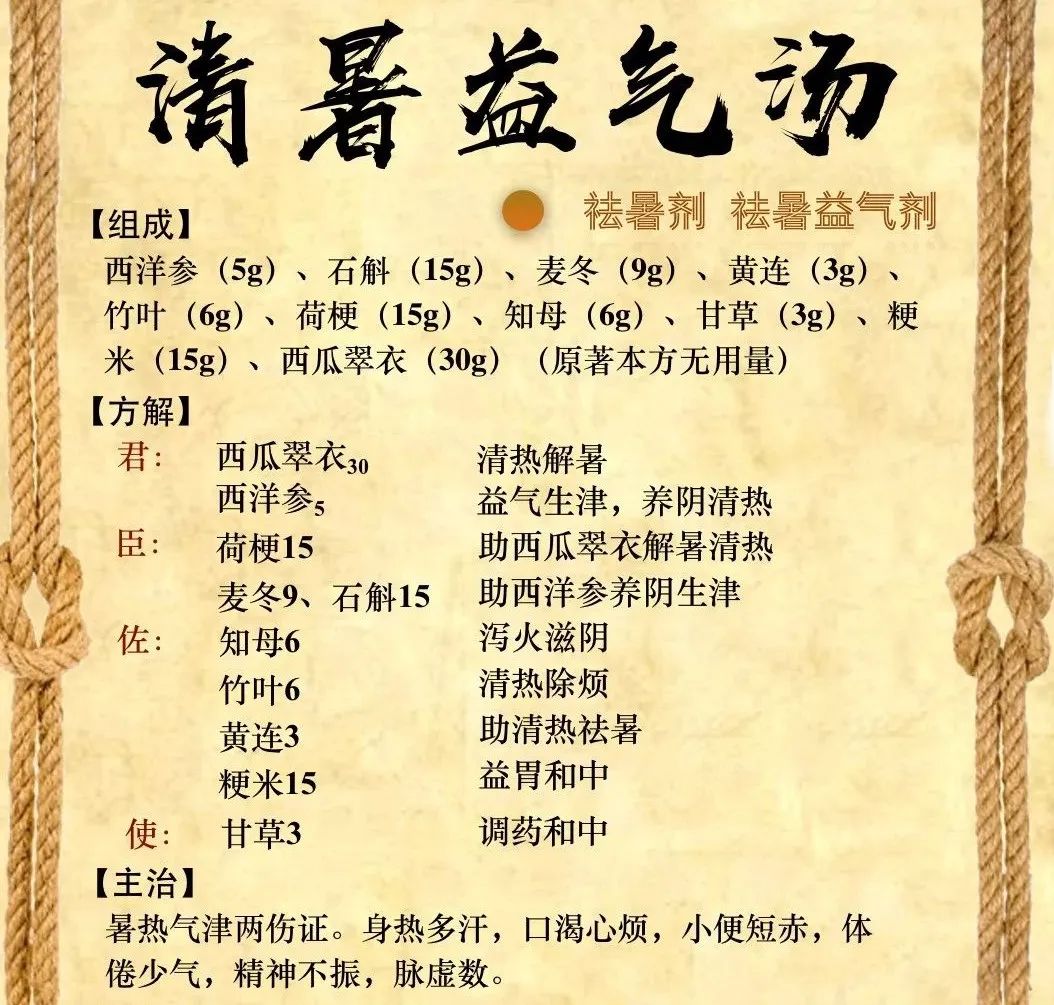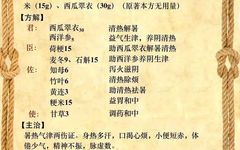Currently, there are many exercise videos online, and some people have started to follow along, even running outdoors in the hot weather to sweat more. However, after a few days of this, they feel unwell, their mental state declines, and they easily become irritable and fatigued. Climbing stairs makes them feel palpitations, and they may feel an increase in body temperature and thirst. This situation is a mild heat stroke caused by improper exercise in hot weather, classified as a condition of both Qi and body fluids being injured by summer heat, and one can try Wang’s Qing Shu Yi Qi Decoction.
 This Qing Shu Yi Qi Decoction is derived from Wang Mengying’s Wen Re Jing Wei, and it is indicated for conditions of summer heat injuring both Qi and body fluids. Clinical applications include symptoms such as body heat, excessive sweating, thirst, irritability, short and red urination, fatigue, and a weak and rapid pulse as key diagnostic points.
This Qing Shu Yi Qi Decoction is derived from Wang Mengying’s Wen Re Jing Wei, and it is indicated for conditions of summer heat injuring both Qi and body fluids. Clinical applications include symptoms such as body heat, excessive sweating, thirst, irritability, short and red urination, fatigue, and a weak and rapid pulse as key diagnostic points.
This formula is different from Li Dongyuan’s Qing Shu Yi Qi Decoction mentioned later, which emphasizes the patient’s constitution, particularly those who are generally deficient in both Qi and Yin, and suddenly feel the invasion of summer dampness, leading to symptoms such as body heat, headache, thirst, spontaneous sweating, fatigue in the limbs, chest tightness, heaviness in the body, loss of appetite, loose stools, short and red urination, greasy tongue coating, and a weak pulse.
Reference Dosage: 5g of Xi Yang Shen (American Ginseng), 15g of Shi Hu (Dendrobium), 9g of Mai Dong (Ophiopogon), 3g of Huang Lian (Coptis), 6g of Zhu Ye (Bamboo Leaf), 15g of He Geng (Lotus Stem), 6g of Zhi Mu (Anemarrhena), 3g of Gan Cao (Licorice), 15g of Jing Mi (Glutinous Rice), and 30g of Xi Gua Cui Yi (Watermelon Peel). Method of Preparation: Decoction in water, one dose per day, taken twice daily, morning and evening.
In this formula, the sweet and cool properties of Xi Gua Cui Yi (Watermelon Peel) work similarly to the Bai Hu Decoction, clearing summer heat and generating fluids to quench thirst. Sui Xi Ju Yin Shi Pu states that Xi Gua Cui Yi: “Cools and clears summer heat.” Xi Yang Shen (American Ginseng) is sweet and bitter, cool in nature, benefiting Qi, clearing heat, and generating fluids. Ben Cao Cong Xin states: “It tonifies the lungs, reduces fire, generates body fluids, and alleviates fatigue. It is suitable for those who are deficient yet have heat.” These two herbs together serve as the monarch herbs. Summer heat injures Yin, and He Geng can assist Xi Gua Cui Yi in clearing heat and relieving summer heat, while also regulating Qi and relieving chest tightness. Shi Hu and Mai Dong are both sweet and cold, moistening and assisting Xi Yang Shen in benefiting Qi, nourishing Yin, clearing heat, and generating fluids, serving as minister herbs. For summer heat disturbing the heart, a small amount of the bitter and cold Huang Lian is used to clear heat and drain fire, enhancing the ability to clear heat and dispel summer heat. Zhi Mu, being bitter and cold, not only drains fire but also nourishes Yin, making it a wonderful herb. Zhu Ye is sweet and bland, clearing heat and alleviating irritability, serving as an assistant herb. Summer heat injures Qi, and Jing Mi can benefit Qi and generate fluids, while Gan Cao harmonizes the stomach and moderates the cold herbs’ effects on the stomach, also harmonizing the properties of the herbs, serving as a guiding herb. The combination of these herbs allows for a synergy of heat-clearing and Qi-tonifying properties, benefiting without retaining pathogens, and draining without harming the upright Qi; generating fluids without being turbid, and drying without harming the fluids, collectively achieving the effects of clearing heat, benefiting Qi, nourishing Yin, and generating fluids.
However, Qing Shu Yi Qi Decoction is not solely Wang’s formula; Li Dongyuan also discusses it in his Pei Wei Lun.
Li Dongyuan’s Qing Shu Yi Qi Decoction is found in Nei Wai Shang Bian Huo Lun • Shu Shang Wei Qi Lun, based on the Suwen stating, “Qi deficiency with body heat is caused by summer heat,” and further points out, “During the long summer, damp heat prevails.” This formula is aimed at individuals who are generally Qi deficient and are affected by summer dampness, leading to symptoms such as fatigue in the limbs, poor spirit, chest tightness, shortness of breath, body heat and irritability, loose stools, short and yellow urination, loss of appetite, thirst, spontaneous sweating, heaviness in the body, pale tongue with teeth marks, greasy or dry tongue coating, and a weak, large, or rapid pulse.
Reference Dosage: 3g of Huang Qi (Astragalus), 3g of Cang Zhu (Atractylodes), 3g of Sheng Ma (Cimicifuga), 15g of Ren Shen (Ginseng), 15g of Ze Xie (Alisma), 15g of Shen Qu (Malt), 15g of Ju Pi (Tangerine Peel), 10g of Bai Zhu (Atractylodes), 10g of Mai Men Dong (Ophiopogon), 10g of Dang Gui (Angelica), 6g of Zhi Gan Cao (Honey-Fried Licorice), 10g of Qing Pi (Green Tangerine Peel), 10g of Huang Bai (Phellodendron), 10g of Ge Gen (Kudzu), and 10g of Wu Wei Zi (Schisandra). This formula is derived from the modified Bu Zhong Yi Qi Decoction with the addition of Chai Hu, and it also has the effects of clearing summer heat, transforming dampness, and generating fluids, with a greater emphasis on benefiting Qi and strengthening the spleen. Li advocates treating summer diseases with methods that clear dryness, thus this formula, while treating summer season illnesses, contains fewer heat-clearing herbs, with its main efficacy being to strengthen the spleen and dry dampness.
Characteristics of Summer Heat Pathogenic Factors: Summer heat is a Yang pathogenic factor with distinct seasonality, primarily occurring after the summer solstice and before the beginning of autumn. Therefore, the Suwen • Re Lun states: “Illnesses occurring before the summer solstice are termed warm diseases, while those occurring after are termed summer heat diseases.” The pathogenic characteristics of summer heat are: Summer heat is a Yang pathogenic factor, characterized by its heat. Summer heat is generated from fiery heat, which belongs to Yang, thus summer heat is classified as a Yang pathogenic factor. Therefore, its pathogenic effects often manifest as a series of symptoms such as high fever, thirst, flushed face, and a rapid pulse, indicative of Yang heat symptoms.
Summer heat rises and disperses, easily disturbing the spirit and injuring body fluids. In summer, we can observe the heat rising from the scorching playground, which is a manifestation of summer heat rising. Thus, it easily disturbs the spirit or invades the head, leading to symptoms such as chest discomfort, restlessness, and dizziness. We can also see that when water is poured onto a hot iron plate, a portion of the water instantly evaporates, indicating that summer heat is a Yang pathogenic factor, and it can cause the pores to open and lead to excessive sweating, easily injuring body fluids. Since Qi and body fluids are closely related, both originating from the transformation of food and water by the spleen and stomach, and both circulating throughout the body via the San Jiao, Qi and body fluids can transform into each other; that is, Qi can generate fluids, and fluids can also transform into Qi. Therefore, if one of them is damaged, the transformation of the other will correspondingly decrease. Moreover, body fluids are also one of the carriers of Qi, so when summer heat causes disease, it injures body fluids while Qi also escapes in large amounts. Thus, clinically, in addition to symptoms of thirst, dry lips, and short red urination indicating insufficient body fluids, one may also observe shortness of breath and fatigue. In severe cases, one may experience sudden fainting or loss of consciousness due to the failure of the clear orifices to be nourished.

Note: This account aims to promote traditional Chinese medicine culture. The TCM knowledge mentioned in this article is for learning and exchange purposes only.
WeChat has been updated! If you neither ★ starred me nor liked or “viewed” my articles, the system will assume you do not need to receive information related to herbal medicine knowledge, and in the end, you will not receive our article updates.
Thank you for your patience in reading. If you find it interesting, please click “like” and “view” at the bottom.

